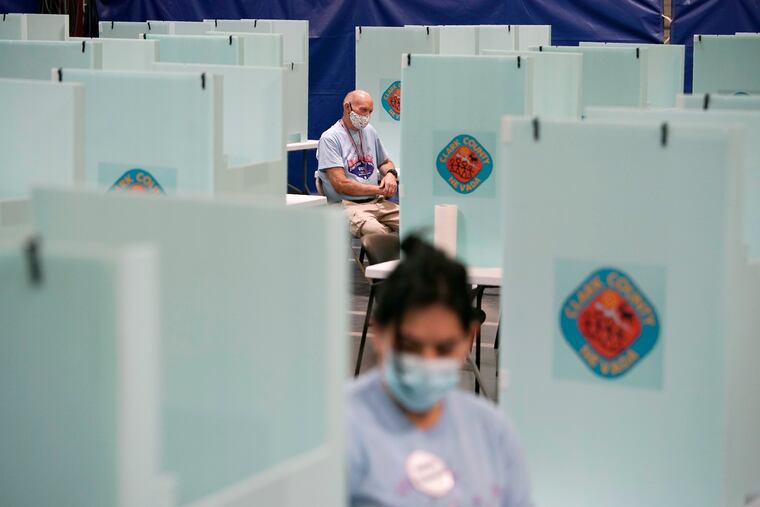It’s time to come to terms with ‘Election Week’ | Opinion
Adjust your Election Day expectations now.

As Pennsylvania adjusts to its relatively recent role as a swing state, voters across the commonwealth are starting to realize how important it is to run an efficient, trustworthy election process. Thanks to the coronavirus, that task is now a lot harder. While local, state, and federal officials work to prevent a catastrophe in November, it’s time for reporters, editors, and news broadcasters to do the same. The election won’t be normal, and they shouldn’t report on it as if it were normal.
The first thing we should do is dispense with the term Election Day. Thanks to the pandemic, more voters than ever are likely to cast their ballots early or absentee/by mail. Pennsylvania is one of dozens of states that allow any registered voter to vote by mail. But to be counted, ballots must be requested by Oct. 27 and received by Nov. 3.
But the timing is still uncertain — the deadline to request a ballot is Oct. 27, but the ballot has to be received by Nov. 3 to be counted. As the Postal Service warns of possible massive delays, Pennsylvanians would be safer to request and return their ballots early.
» READ MORE: Everything you need to know about in-person and mail voting in Pennsylvania
Those delays could result in delayed election results, too. We think of Election Day as the day we find out who our next president is, but this too will likely change this year. Pennsylvania, like some other states, still requires that mail-in votes only be counted after in-person votes. It may take weeks to tally votes and complete recounts before a final result is known, and a delayed result in Pennsylvania could decide the election.
In 2000, the country had to wait until 37 days after Election Day for Al Gore to concede. In 2020, expect similar delays. In early November, the “results” may look as if they’re changing. A recent poll found that 72% of Democrats were planning to vote by mail, compared with just 22% of Republicans. That means the first ballots counted are likely to lean Republican, with the later ballots favoring Democrats. Republicans shouldn’t feel safe if they go to bed on Nov. 3 with a comfortable lead and a small portion of the ballots counted — the results could change dramatically in the following weeks, and it doesn’t mean there was any funny business.
This degree of uncertainty doesn’t have to create a crisis. Under federal law, as long as each state has an official count by Dec. 8, 35 days after Election Day, the results are official. The final deadline is Dec. 14, when the Electoral College meets in state capitals for the formal presidential election. This timetable means there’s built-in room for delays, recounts, and unforeseen obstacles.
» READ MORE: How TV, media can stop a U.S. meltdown on 11/4 | Will Bunch Newsletter
What will cause a problem is if most Americans think that a delay is the same thing as a constitutional crisis. That’s why it’s so important for the media to report this right. Journalists should point out that immediate electoral results are often an indication of fraud or forgery, not the other way around. Just look at the recent crisis in Belarus, where the unpopular president “won” reelection with 80% of the vote just minutes after polls closed.
Journalists – and election administrators, and politicians, and good citizens – also need to explain how delays happen. Here’s a hypothetical: The election is close, and it all comes down to Pennsylvania. What happens if a water main breaks at a Philadelphia polling place? All of Philadelphia County would have to delay announcing its results, which could mean that because of one broken pipe, the nationwide result ends up delayed. The chances of something like this happening are too great to discount.
There are other challenges facing our elections, too. The threat of foreign interference hasn’t gone away. If anything, Russia’s operations in 2016 probably served to encourage other countries – Iran, China, North Korea – to try to sow doubt and confusion in our elections. Yet another reason why all of us, especially those of us with the biggest megaphones, should be circumspect and cool-headed in November, lest we become the “useful idiots” of foreign adversaries.
Pennsylvania is the birthplace of our Constitution, and could be the keystone of the whole election. This cycle won’t look like any previous one, and that’s OK, as long as we’re responsible, ready for the unexpected, and keep the safety and integrity of our elections front of mind.
Trey Grayson is the former secretary of state of Kentucky, former chairman of the Republican Association of Secretaries of State, and cochair of the Advisory Board of the Secure Elections Project.